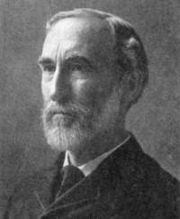Chemical thermodynamics

J. Willard Gibbs - founder of chemical thermodynamics
In
thermodynamics, chemical thermodynamics is the mathematical study
of the interrelation of
heat and
work with
chemical reactions or with a physical change of
state within the confines of the
laws of thermodynamics. Chemical thermodynamics can be generally thought
of as the application of mathematical methods to the study of chemical
questions and is concerned with the spontaneity of processes.
The structure of chemical thermodynamics is based on the first two
laws of thermodynamics. Starting from the first and second laws of
thermodynamics, four equations called the "fundamental equations of Gibbs"
can be derived. From these four, a multitude of equations, relating the
thermodynamic properties of the
thermodynamic system can be derived using relatively simple mathematics.
This outlines the mathematical framework of chemical thermodynamics.
History
In 1865, the German physicist
Rudolf Clausius, in his Mechanical Theory of Heat, suggested that the
principles of
thermochemistry, e.g. such as the
heat evolved in
combustion reactions, could be applied to the principles of
thermodynamics.
Building on the work of Clausius, between the years 1873-76 the American
mathematical physicist
Willard Gibbs published a series of three papers, the most famous one being
the paper
On the Equilibrium of Heterogeneous Substances. In these papers, Gibbs
showed how the first two
laws of thermodynamics could be measured graphically and mathematically to
determine both the
thermodynamic equilibrium of chemical reactions as well as their tendencies
to occur or proceed. Gibbs� collection of papers provided the first unified body
of thermodynamic theorems from the principles developed by others, such as
Clausius and
Sadi Carnot.
During the early 20th century, two major publications successfully applied
the principles developed by Gibbs to chemical processes, and thus established
the foundation of the science of chemical thermodynamics. The first was the 1923
textbook Thermodynamics and the Free Energy of Chemical Substances by
Gilbert N. Lewis and
Merle
Randall. This book was responsible for supplanting the
chemical affinity for the term
free energy in the English-speaking world. The second was the 1933 book
Modern Thermodynamics by the methods of Willard Gibbs written by
E. A. Guggenheim. In this manner, Lewis, Randall, and Guggenheim are
considered as the founders of modern chemical thermodynamics because of the
major contribution of these two books in unifying the application of
thermodynamics to
chemistry.
Overview
The primary objective of chemical thermodynamics is the establishment of a
criterion for the determination of the feasibility or
spontaneity of a given transformation.
In this manner, chemical thermodynamics is typically used to predict the
energy
exchanges that occur in the following processes:
-
Chemical reactions
-
Phase changes
- The formation of solutions
The following
state functions are of primary concern in chemical thermodynamics:
-
Internal energy (U)
-
Enthalpy (H).
- Entropy
(S)
-
Gibbs free energy (G)
Most identities in chemical thermodynamics arise from application of the
first and second laws of thermodynamics, particularly the
law of conservation of energy, to these state functions.
Chemical energy
It is the potential of a
chemical substance to undergo a transformation through a
chemical reaction or transform other chemical substances. Breaking or making
of chemical bonds, involves
energy, that
may be either absorbed or evolved from a chemical system.
Energy that can be released (or absorbed) because of a reaction between a set
of chemical substances is equal to the difference between the energy content of
the products and the reactants.This change in energy is called the change in
internal energy of a chemical reaction. It can be calculated using the
formula
ΔUo = Σ(ΔUfoproducts) - Σ(ΔUforeactants).
Where ΔUforeactants is the
internal energy of formation of the reactant molecules that can be
calculated from the
bond
energies of the various chemical bonds of the molecules under consideration
and ΔUfoproducts is the internal energy of
formation of the product molecules. The internal energy change of a process is
equal to the heat change if it is measured under conditions of constant volume,
as in a closed rigid container such as a
bomb
calorimeter. However, under conditions of constant pressure, as in reactions
in vessels open to the atmosphere, the heat change measured is not always equal
to the internal energy change, because pressure-volume work also releases or
absorbs energy. (The heat change at constant pressure is called the
enthalpy
change, in this case the
enthalpy of formation).
Another useful term is the
heat of combustion, it is the energy released due to a
combustion
reaction and often applied in the study of
fuels. Food is similar to hydrocarbon fuel and carbohydrate fuels, and when
it is oxidized, its caloric content is similar (though not assessed in the same
way as a hydrocarbon fuel-- see
food
energy).
In chemical thermodynamics the term used
for the chemical potential energy is
chemical potential and for chemical transformation an equation most often
used is
Gibbs-Duhem equation
-

|

